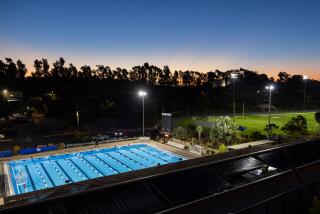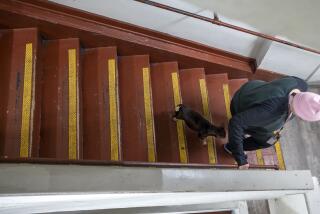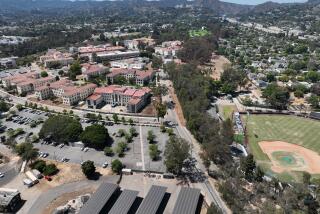L.A. Unified Can Seek Funds Paid for Hotel
- Share via
A judge has cleared the way for the Los Angeles Unified School District to recover nearly $50 million it paid to real estate magnate Donald Trump in an abortive attempt to condemn the former Ambassador Hotel for a high school.
But, in a collateral ruling, the judge left open the possibility that Trump’s partnership, which owns the hotel, could win back some or all of the money to compensate for deception by the district during condemnation negotiations.
Elated school officials declared the ruling a near total victory.
“It’s incredible. It’s great,” said board member David Tokofsky. “We’re either going to get the property or the money or some combination of property and money.”
But an attorney for Ambassador Associates, of which Trump is general partner and 20% owner, said his client will not pay anything until after a jury trial to determine the amount of damages the district may owe.
Trump attorney Harvey R. Friedman predicted that the district would wind up owing more than $50 million in damages. In the meantime, he said, his client plans to appeal the rest of the ruling.
The convoluted case stems from the district’s 1990 decision to build a Mid-City high school on a portion of the hotel site.
After unsuccessfully trying to negotiate a voluntary sale, the district filed a condemnation claim, using its power to take private property for needed purposes. It deposited $47.9 million--its estimate of the value of the rear 17 acres of the 24-acre property--with Trump’s partnership, then called Trump-Wilshire Associates.
When Trump-Wilshire insisted on a price of $125 million, the land sat idle as both parties awaited a trial date to establish compensation.
After several attempts to negotiate a satisfactory price out of court, the school district withdrew its bid in 1994, citing economic reasons. By then, the Board of Education had decided to purchase a site just west of downtown, where the Belmont Learning Center is now under construction.
Although the Ambassador property was once again its to develop, the Trump partnership maintained that such an undertaking would no longer be financially feasible.
Instead of giving the deposit back, Trump filed suit, alleging that the district abused its power--first by threatening to condemn the property in order to pressure Trump into selling it for less than its value, and then by delaying the condemnation proceeding by refusing to take possession.
*
By keeping the property tied up for more than three years, the school district prevented the construction of a mixed-use skyscraper on the site, the suit said.
The school district contended that Trump was bound to lose money from the beginning. Building a skyscraper in an area with declining real estate values and rising office vacancies would have resulted in a financial fiasco regardless of the school district’s intervention, said Ed Szczepkowski, the attorney representing the school district.
In a 25-page ruling released late Wednesday after a three-week trial, Los Angeles Superior Court Judge Harvey A. Schneider concluded that the district had largely acted properly.
Schneider wrote that there was no law prohibiting the district from approaching a property owner with a development proposal and that, once the negotiations failed, it was proper for the district to resort to eminent domain. Nor was the district required to take possession of the property before its value was determined.
Schneider also concluded that any financial damage to Trump’s partnership from the district’s decision to back out of the purchase was minimal.
He said Ambassador Associates has continued to earn $1 million annually in parking and movie-filming fees, and has saved millions of dollars in interest by using the district’s money to pay off its note on the property.
*
But the judge assailed the district for its deception in a negotiation ostensibly intended to settle the condemnation proceeding. He said one district real estate employee lied when he kept secret the fact that one of Trump’s partners--not the district--had initiated settlement talks. Schneider said that led Trump to spend four fruitless months in talks under the false impression that the district might settle.
School district attorney Szczepkowski downplayed the significance of the four-month delay. “We pointed out that because he paid off his mortgage, during the three years Trump saved over $16 million in interest,” Szczepkowski said. “Any delay benefited Mr. Trump. It didn’t damage him.”
Szczepkowski said the district will consider foreclosure proceedings on the Ambassador if Trump refuses to refund the money.
That prospect led Tokofsky to speculate that the district could not only recover its money, but also resume consideration of a high school on the Ambassador site.
“We know we need four high schools in that area,” Tokofsky said. “I would hope we would want a school there.”
More to Read
Sign up for Essential California
The most important California stories and recommendations in your inbox every morning.
You may occasionally receive promotional content from the Los Angeles Times.











